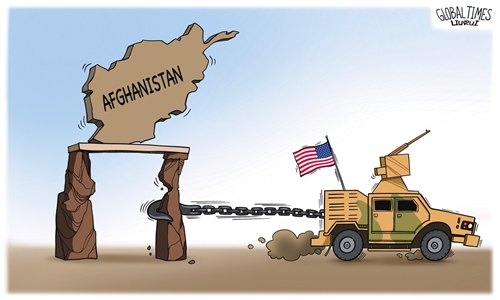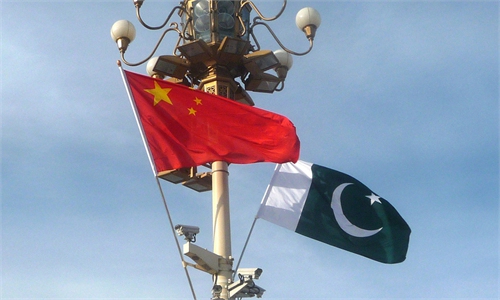COMMENTS / EXPERT ASSESSMENT
Attempts by the US and India to sabotage CPEC doomed to fail

US, India. Illustration: Xia Qing/GT
As the flagship project under the framework of the China-proposed Belt and Road Initiative (BRI), the China-Pakistan Economic Corridor (CPEC) has become a main target of fierce slander by anti-China forces in the US, India and some other countries. Responding to the relentless attacks, a Pakistani official recently said that the US was "conniving in cahoots with India against the economic lifeline of Pakistan."
The US and India continue to "make attempts to maneuver Pakistan out of" the BRI, Khalid Mansoor, a special advisor to Prime Minister Imran Khan of Pakistan on CPEC affairs, was quoted as saying in a report from local news outlet The Dawn on Sunday.
"There's no way Pakistan will forgo any of its benefits. [The US] has more than once burnt its fingers in [the Western] alliance in the past," Mansoor said during the CPEC Summit at the Institute of Business Administration, adding that their attempts to undercut China's influence in the region will fail.
Pakistan has benefitted greatly from the CPEC, but some in the West have spared no efforts in cooking up a debt trap story to undermine cooperation between Pakistan and China. The US, India and a gang of other forces have been attempting to not only sabotage the CPEC but also the BRI as a whole through a relentless propaganda campaign.
Aside from the ill-intend propaganda, the US has been attempting to form its own version of infrastructure projects in order to rival the BRI, including the so-called Build Back Better World (B3W) plan under the G7 framework.
Despite constant external slander and disruptions, the CPEC has been progressing smoothly as an important pilot project of the BRI. It has maintained a positive momentum in development, making concrete contributions to Pakistan's national development and regional connectivity since its launch in 2013.
Behind each project are tangible benefits that have already been enjoyed by Pakistan, including stable power supply, the setup of industrial parks and improvement of infrastructures. Over the past eight years, the CPEC has brought a total of $25.4 billion of direct investment and created 75,000 local jobs, according to Chinese official data.
Investments under the BRI have been serving as the main source of foreign investment for Pakistan. Such investments have not only boosted growth of the Pakistani economy, but also facilitated the improvement of Pakistan's business environment for global businesses.
The first development phase of the corridor has been devoted to infrastructure construction and yielded fruitful results; now with the project entering its second development phase, cooperation is expected go deeper and wider, bringing about benefits to not only Pakistan and China, but also contribute to the stability and development of the region.
Meanwhile, there have been some discussions surrounding an extension of the CPEC into Afghanistan for years. Though there remain challenges given Afghanistan's current domestic situation, such a move, if carried out, would definitely boost social and economic development not just in Afghanistan but also the region as a whole.
It is no secret that the vibrant development of the CPEC and the BRI as a whole has raised fear and resentfulness among the hegemonic US and its followers. But the truth is that the West's attacks will not succeed, and it will not be a problem for any country to launch competitive projects as long as it is under a fair environment and free of geopolitical calculations. In order to compete with China in other regions, the US may need to put local countries' interests first, instead of its own hegemonic position.
The article was compiled based on an interview with Liu Zongyi, secretary-general of the Research Center for China-South Asia Cooperation at the Shanghai Institutes for International Studies. bizopinion@globaltimes.com.cn



